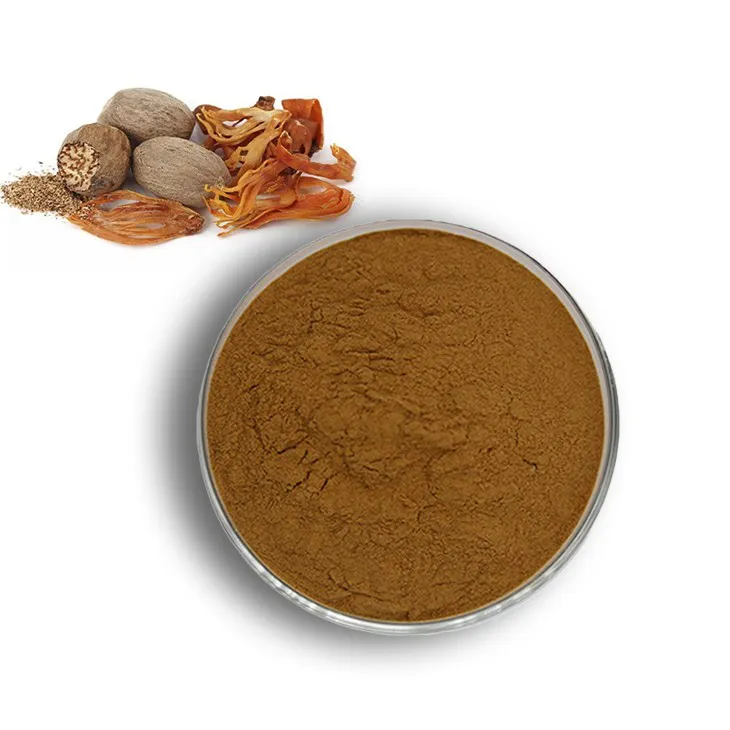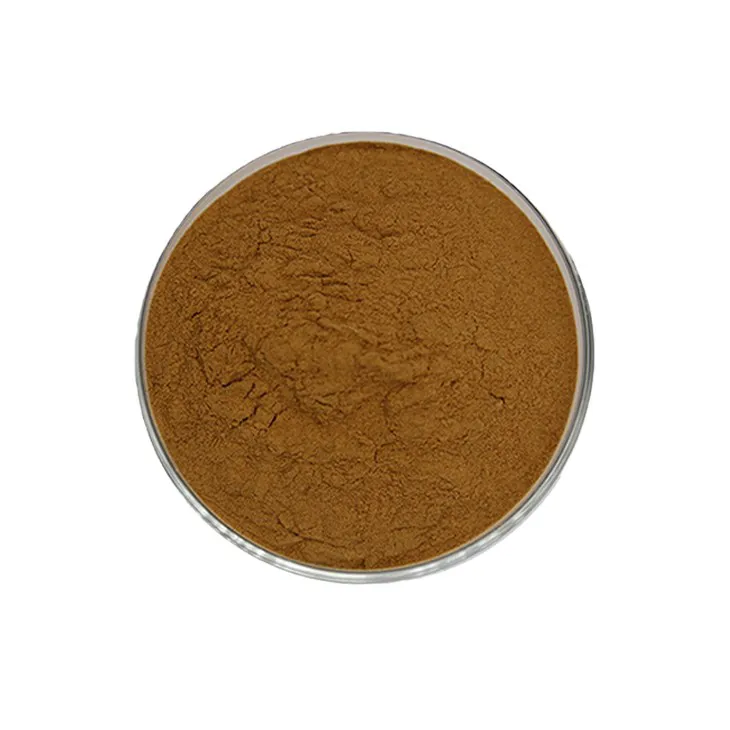- 0086-571-85302990
- sales@greenskybio.com
Is nutmeg extract beneficial for diabetes? Are these all safe and suitable for diabetic patients?
2024-11-11

1. Introduction
Diabetes is a chronic metabolic disorder that affects millions of people worldwide. Management of diabetes typically involves lifestyle modifications, such as diet and exercise, along with medications in some cases. In the search for complementary approaches to diabetes management, natural products like Nutmeg Extract have come under scrutiny. Nutmeg, the seed of the Myristica fragrans tree, has a long history of use in traditional medicine for various ailments. However, when considering its use in diabetes, it is crucial to evaluate both its potential benefits and safety aspects.

2. Nutmeg Extract: Composition and Properties
2.1 Chemical Components
Nutmeg contains a variety of bioactive compounds. Some of the key components include myristicin, elemicin, and safrole. Myristicin, in particular, has been the focus of much research due to its potential pharmacological activities. These compounds are responsible for the characteristic flavor and aroma of nutmeg, as well as its potential health effects.
2.2 Traditional UsesIn traditional medicine systems, nutmeg has been used for digestive problems, pain relief, and as a general tonic. It has also been used in some cultures to treat conditions that may be related to diabetes, such as improving blood circulation and reducing inflammation. However, traditional uses do not always translate directly into modern medical applications, and scientific investigation is necessary to validate these claims.

3. Potential Benefits of Nutmeg Extract in Diabetes
3.1 Anti - inflammatory Effects
Chronic inflammation is associated with the development and progression of diabetes. Some studies suggest that the bioactive compounds in nutmeg extract, such as myristicin, may possess anti - inflammatory properties. Inflammation in adipose tissue, liver, and pancreas can disrupt normal metabolic processes, leading to insulin resistance and impaired glucose tolerance. By reducing inflammation, nutmeg extract may potentially help in improving these metabolic dysfunctions. For example, in vitro studies have shown that certain components of nutmeg can inhibit the production of inflammatory cytokines, which are molecules involved in the inflammatory response.
3.2 Antioxidant ActivityOxidative stress is another factor implicated in diabetes. High blood glucose levels can lead to the overproduction of reactive oxygen species (ROS), which can damage cells and tissues, including pancreatic beta - cells responsible for insulin production. Nutmeg extract has been found to exhibit antioxidant activity, scavenging free radicals and reducing oxidative damage. Antioxidants in nutmeg, such as phenolic compounds, can help protect cells from ROS - induced damage, thereby potentially contributing to better glycemic control. Some animal studies have demonstrated that nutmeg supplementation can improve antioxidant status in diabetic models.
3.3 Effects on Blood Glucose RegulationThere is some evidence to suggest that nutmeg extract may have an impact on blood glucose regulation. In animal studies, nutmeg supplementation has been shown to lower blood glucose levels. It may act through multiple mechanisms, such as enhancing insulin sensitivity or directly affecting glucose metabolism in cells. However, the exact mechanisms underlying these effects are not fully understood and may vary depending on the dosage, duration of treatment, and the specific components of the nutmeg extract.

4. Safety Concerns for Diabetic Patients
4.1 Toxic Components
While nutmeg has potential benefits, it also contains certain components that can be toxic in large amounts. Safrole, for example, has been associated with liver toxicity and carcinogenicity in high doses. Although the levels of safrole in nutmeg are relatively low, and normal culinary use is generally considered safe, when using nutmeg extract in concentrated forms for medicinal purposes, there is a need to be cautious. Diabetic patients may already have compromised liver or kidney function in some cases, which could potentially increase the risk of adverse effects from these toxic components.
4.2 Drug InteractionsDiabetic patients often take medications to manage their blood glucose levels. Nutmeg extract may interact with these medications. For instance, it could potentially interfere with the action of insulin or oral hypoglycemic agents. There is limited research on the specific drug - nutmeg interactions in diabetic patients, but it is important to consider the possibility when contemplating the use of nutmeg extract as a complementary therapy. Any changes in blood glucose levels due to such interactions could lead to hypoglycemia or hyperglycemia, which are both serious concerns for diabetic individuals.
4.3 Allergic ReactionsSome people may be allergic to nutmeg. Allergic reactions can range from mild symptoms such as skin rashes and itching to more severe manifestations like difficulty breathing and anaphylaxis. Diabetic patients who are considering using nutmeg extract should be aware of the risk of allergic reactions, especially if they have a history of allergies to spices or related substances.

5. Research Gaps and Future Directions
5.1 Need for More Clinical Trials
Most of the current evidence regarding the effects of nutmeg extract on diabetes comes from in vitro and animal studies. There is a significant lack of well - designed, large - scale clinical trials in human diabetic patients. Clinical trials are essential to determine the efficacy and safety of nutmeg extract in the context of diabetes management. These trials should consider different dosages, treatment durations, and patient populations to provide more comprehensive data.
5.2 Understanding the MechanismsAlthough some potential mechanisms have been proposed for the beneficial effects of nutmeg extract in diabetes, further research is needed to fully understand how these mechanisms work at the molecular and cellular levels. This knowledge could help in optimizing the use of nutmeg extract and developing more targeted therapies for diabetes.
5.3 Long - term Safety StudiesGiven the potential safety concerns associated with nutmeg extract, long - term safety studies are crucial. These studies should evaluate the effects of chronic nutmeg extract use on various organ functions, including the liver, kidney, and pancreas, in diabetic patients. They should also monitor for any potential cumulative effects of toxic components over time.
6. Conclusion
Nutmeg extract shows some potential benefits in diabetes management, particularly in terms of its anti - inflammatory, antioxidant, and blood - glucose - regulating effects. However, there are also significant safety concerns that need to be addressed. Diabetic patients should not use nutmeg extract as a substitute for conventional diabetes treatments without consulting their healthcare providers. Further research, especially clinical trials, is needed to better understand the role of nutmeg extract in diabetes management and to ensure its safe and effective use.
FAQ:
1. What is nutmeg extract?
Nutmeg extract is derived from the nutmeg seed. It contains various bioactive compounds such as myristicin, elemicin, and safrole. These compounds are thought to have potential pharmacological effects.
2. How could nutmeg extract potentially benefit diabetes?
Some studies suggest that nutmeg extract may have anti - diabetic properties. It might help in regulating blood sugar levels by improving insulin sensitivity. For example, certain components in the extract could potentially influence the signaling pathways related to glucose metabolism. However, more research is needed to fully understand and confirm these effects.
3. Are there any potential risks of using nutmeg extract for diabetic patients?
While nutmeg extract may show some potential benefits, there are also risks. Nutmeg contains compounds that can be toxic in large amounts. Excessive consumption of nutmeg extract may lead to symptoms such as nausea, vomiting, dizziness, and in severe cases, more serious neurological effects. Also, it may interact with other medications that diabetic patients are taking, so it's crucial to consult a doctor before using it.
4. How much nutmeg extract is safe for diabetic patients?
There is no well - established standard amount of nutmeg extract that is safe for diabetic patients. Since it can be toxic in large quantities, it is advisable to start with very small amounts if it is to be used at all. However, again, it is essential to consult a healthcare provider who can consider the individual's overall health status, including any comorbidities and medications being taken.
5. Has there been enough scientific research on nutmeg extract for diabetes?
As of now, there has not been sufficient large - scale, high - quality scientific research on the use of nutmeg extract specifically for diabetes. While some initial studies show promising results, more comprehensive and long - term research is required to determine its true efficacy and safety in diabetes management.
Related literature
- The Potential of Nutmeg and Its Components in Diabetes Mellitus: A Review"
- "Nutmeg Extract: Pharmacological Properties and Potential Applications in Metabolic Disorders"
- ▶ Hesperidin
- ▶ citrus bioflavonoids
- ▶ plant extract
- ▶ lycopene
- ▶ Diosmin
- ▶ Grape seed extract
- ▶ Sea buckthorn Juice Powder
- ▶ Beetroot powder
- ▶ Hops Extract
- ▶ Artichoke Extract
- ▶ Reishi mushroom extract
- ▶ Astaxanthin
- ▶ Green Tea Extract
- ▶ Curcumin Extract
- ▶ Horse Chestnut Extract
- ▶ Other Problems
- ▶ Boswellia Serrata Extract
- ▶ Resveratrol Extract
- ▶ Marigold Extract
- ▶ Grape Leaf Extract
- ▶ blog3
-
High purity olive leaf extract
2024-11-11
-
Lavender oil extraction method
2024-11-11
-
100% organic virgin sea buckthorn fruit oil
2024-11-11
-
Lotus leaf extract powder factory in China
2024-11-11
-
China aged garlic extract supplier
2024-11-11
-
Deer antler extract powder manufacturer
2024-11-11
-
Saw palmetto extract vs whole herb
2024-11-11
-
Chaste Berry Extract
2024-11-11
-
Bitter Melon Extract
2024-11-11
-
Nutmeg Extract
2024-11-11
-
Curcuma Longa Extract
2024-11-11
-
Hedyotis Diffusa Extract
2024-11-11
-
Tongkat Ali Extract Powder
2024-11-11
-
Sugarcane Extract
2024-11-11
-
Withania Somnifera Extract
2024-11-11
-
Acerola Extract
2024-11-11
-
Echinacea Extract
2024-11-11




















